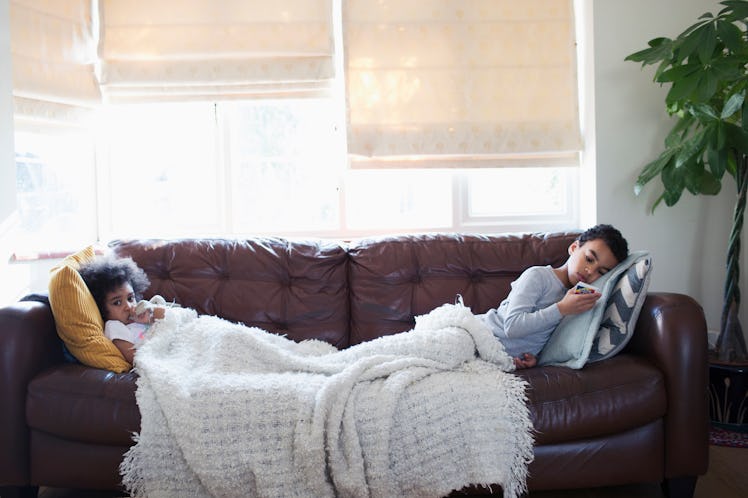Morning Cartoons And The ‘False Sunrise’ Problem
Passing a cell phone to a kid early in the morning rewires their brain as parents snooze.

For 30 years, American parents felt guilty plopping their tots down in front of morning cartoons. To be clear, millions did so anyway, but before the rise of educational programming, it was broadly considered a social ill. Today? Not so much. After all, PBS Kids has real lessons to teach. But sometimes the medium is the message and that message is a biological trigger.
Research now suggests that parents who hand off their kids to the PAW Patrol in order to get a few more minutes of sleep or breakfast are rewiring tiny internal clocks. Morning screen time may solve some problems in the short-term, but the “false sunrise” problem it creates all but guarantees that children will struggle to sleep in over the longer term.
Nurse Practitioner Maile Moore of Boston Children’s Hospital Sleep Center is unequivocal about how counter-productive the morning kid show snooze-fest is. “The worst thing parents can do is have their kid sit in front of the blue light that comes from a screen or an iPhone,” she says.
The most important part of her admonishment is that phrase “blue light.” That’s because the glow thrown off by televisions and cell phones has a short wavelength shifted towards blue, which mimics the early morning sun. When this light hits photoreceptors on the retina, they pass information to the brain to suppress the release of melatonin, the hormone responsible for promoting sleepiness and rest. The result? Wakefulness.
The glowing screen is a well-documented cause of sleep issues in adults, but researchers have found that the effect is much worse on children. Research from chronobiologist Lameese D. Akacem of Rush University Medical Center shows that children’s pupils are proportionally larger than adults’ pupils and have clearer lenses. This allows for more light to hit the retinas and a stronger signal to hit the brain. So long melatonin.
Moore notes that this is particularly problematic for parents passing an iPhone streaming PBS Kids to a child climbing into their bed at 4:30 am. “Once a kid’s eyes get focused on that blue light, they’re training their internal clock to say, ‘Oh, it’s daytime. I need to get up at four in the morning,’” she explains.
So, why can’t parents fix the problem by using new phone tech that removes the offending blue light? Because the light isn’t the only problem. The show is its own reward for the kid, who can become habituated to waking early because they know that’s when they get the shows they love so much.
Moore encourages parents to hold off on any kid expectations or screens until a reasonable hour. Whether they be phones or food. “If they’re up that early and there’s no chance of them going back to sleep, you want to make things as boring as possible for them,” she says.
Which would beg the question: Is Kissinger available to talk to kids about foreign policy at 4 am? Because he could be a real lifesaver.
This article was originally published on